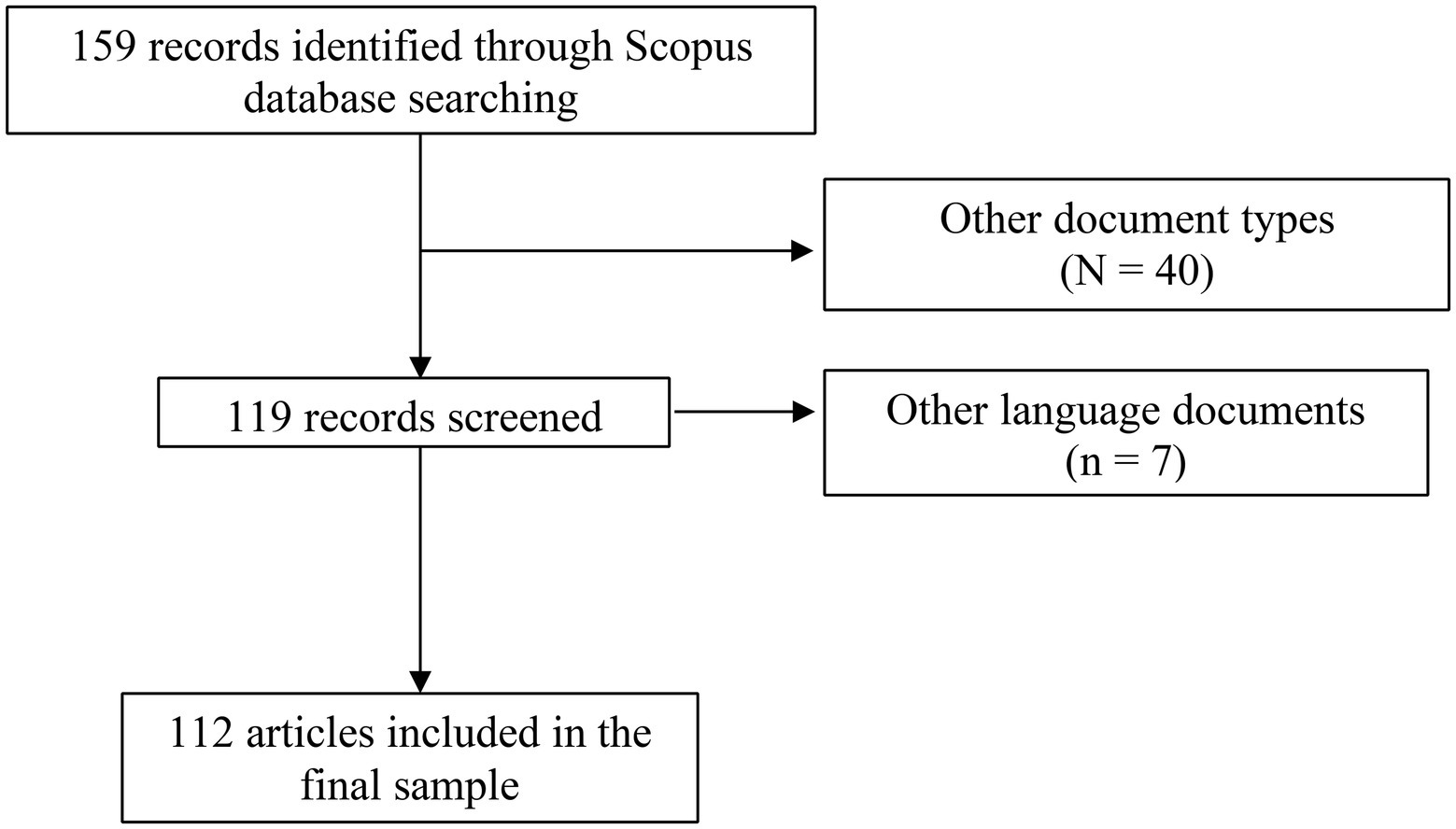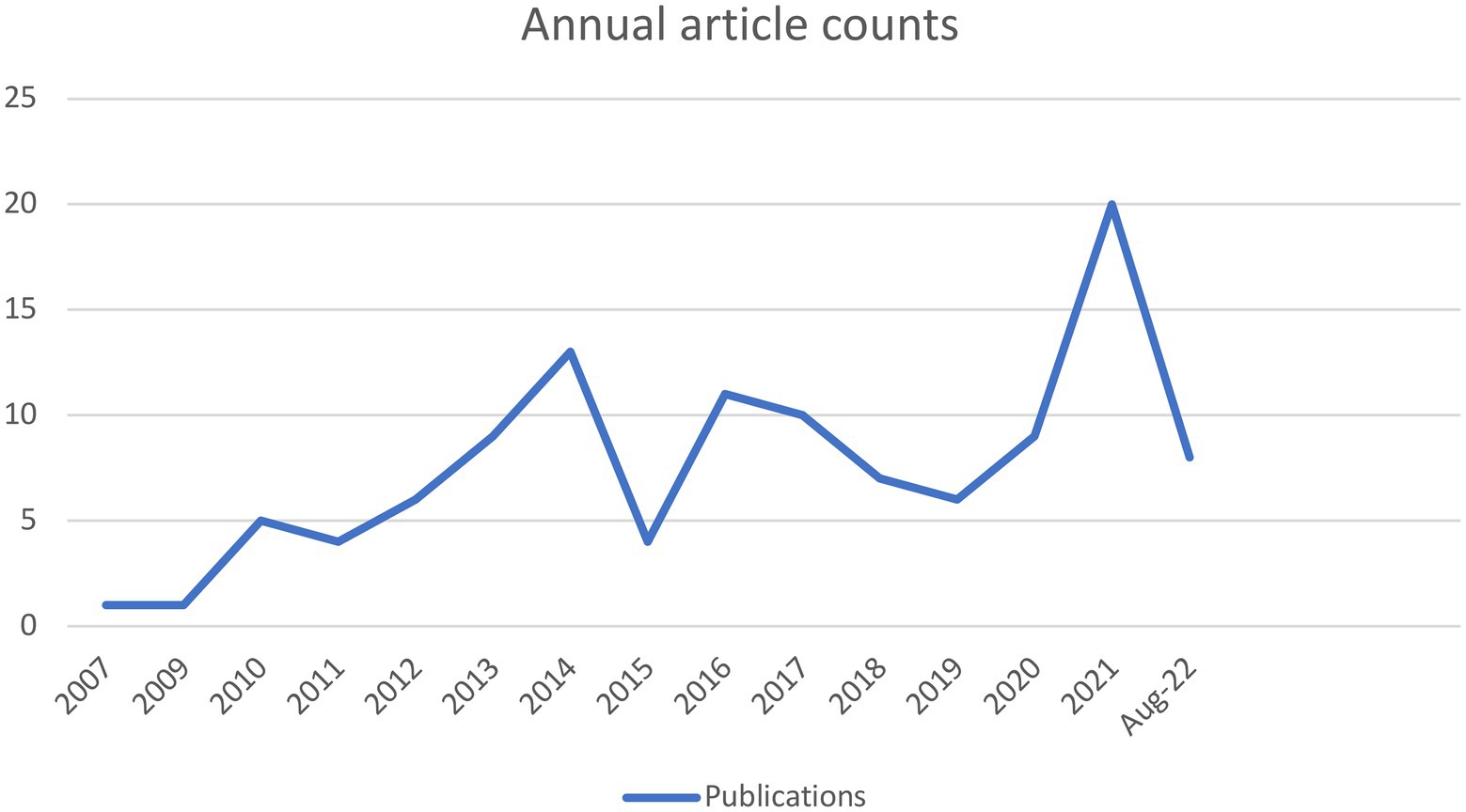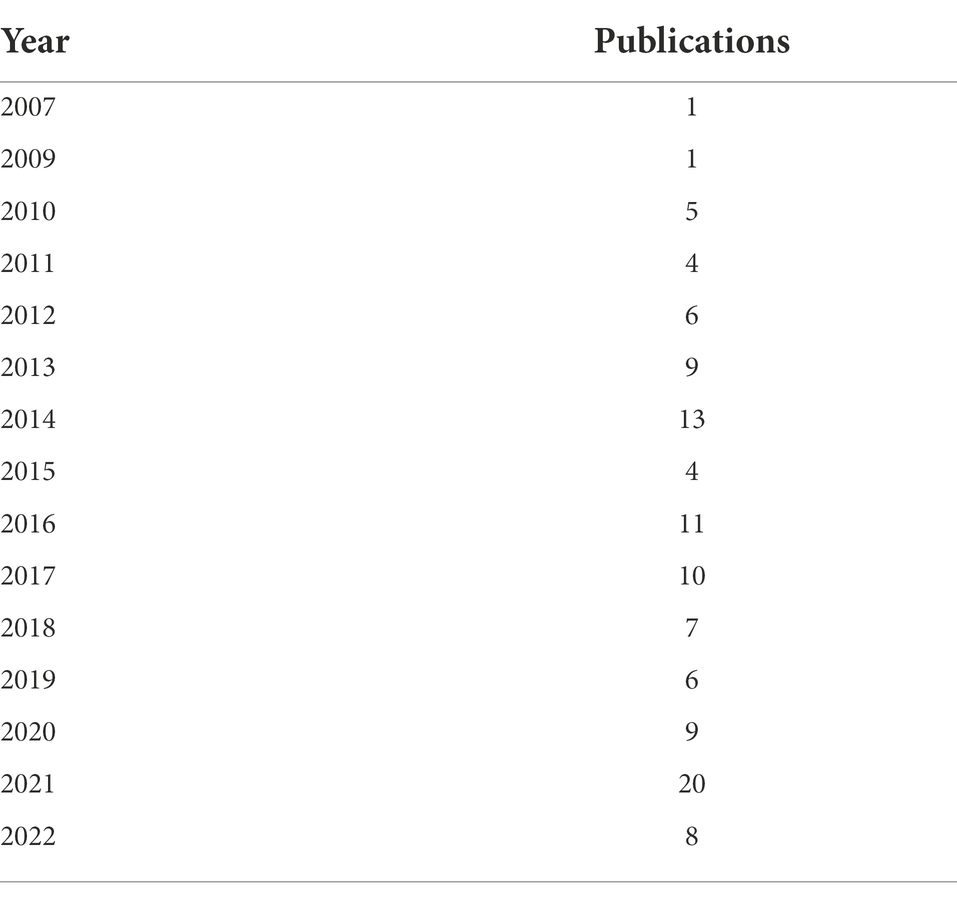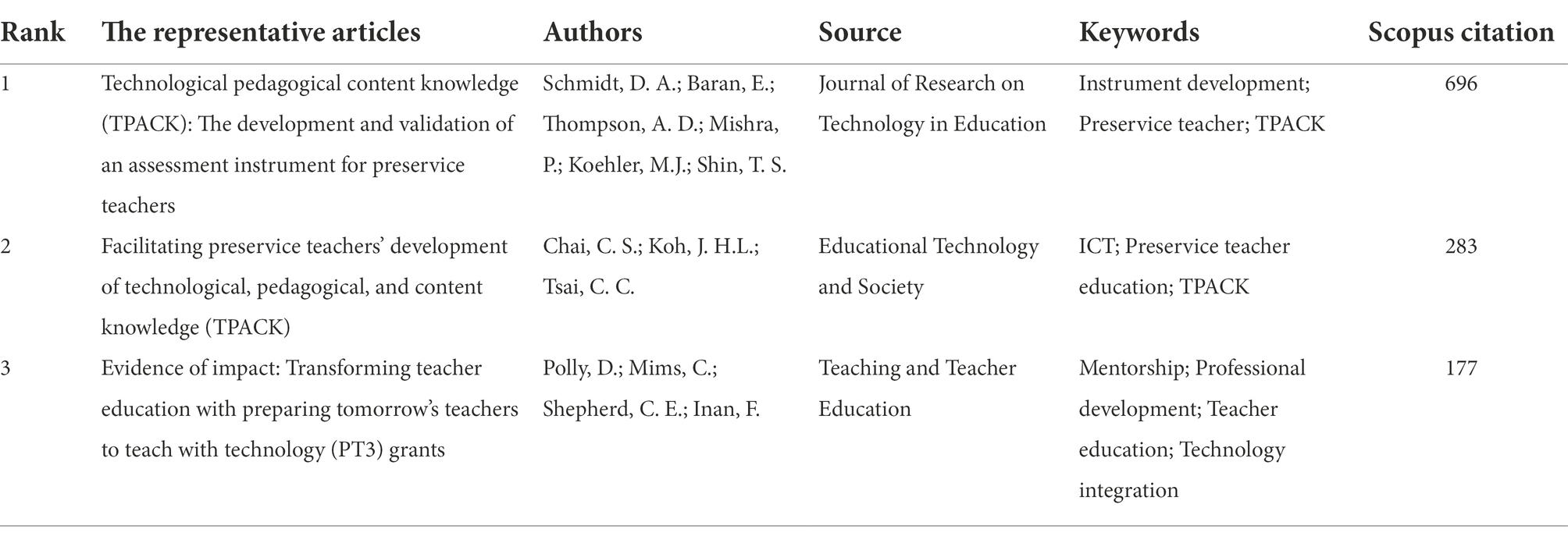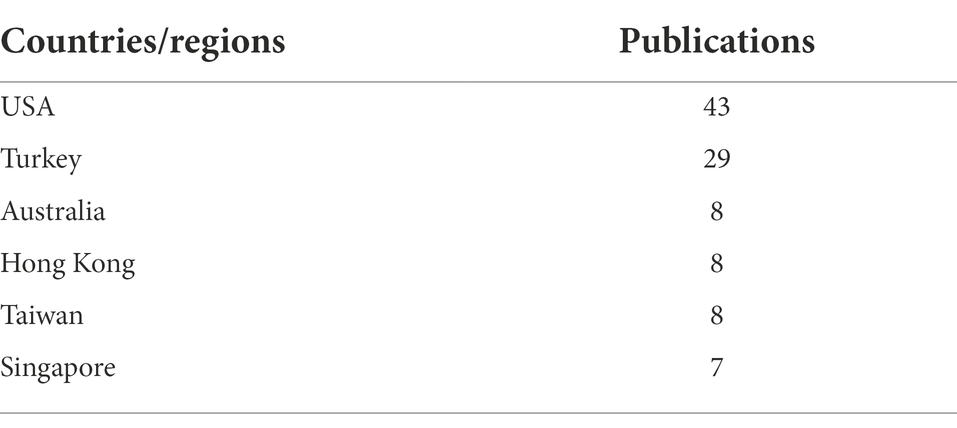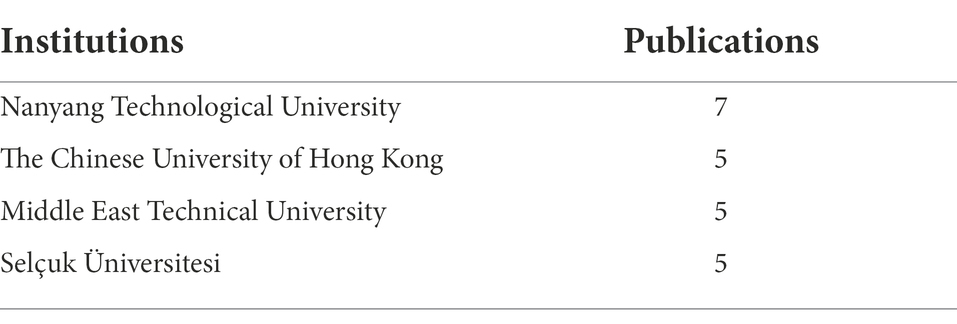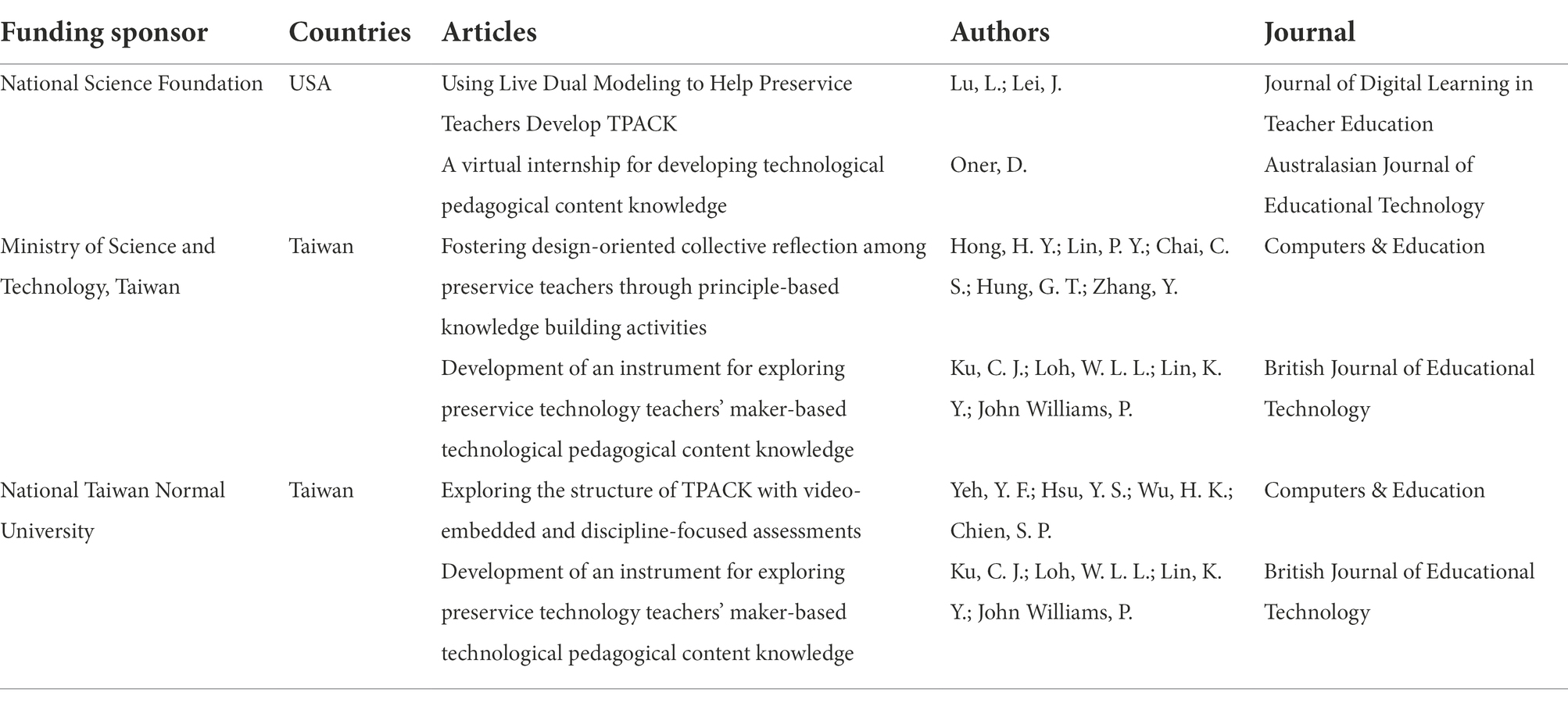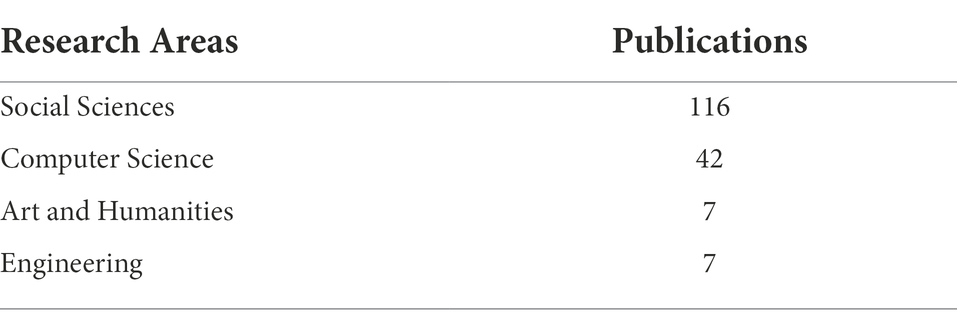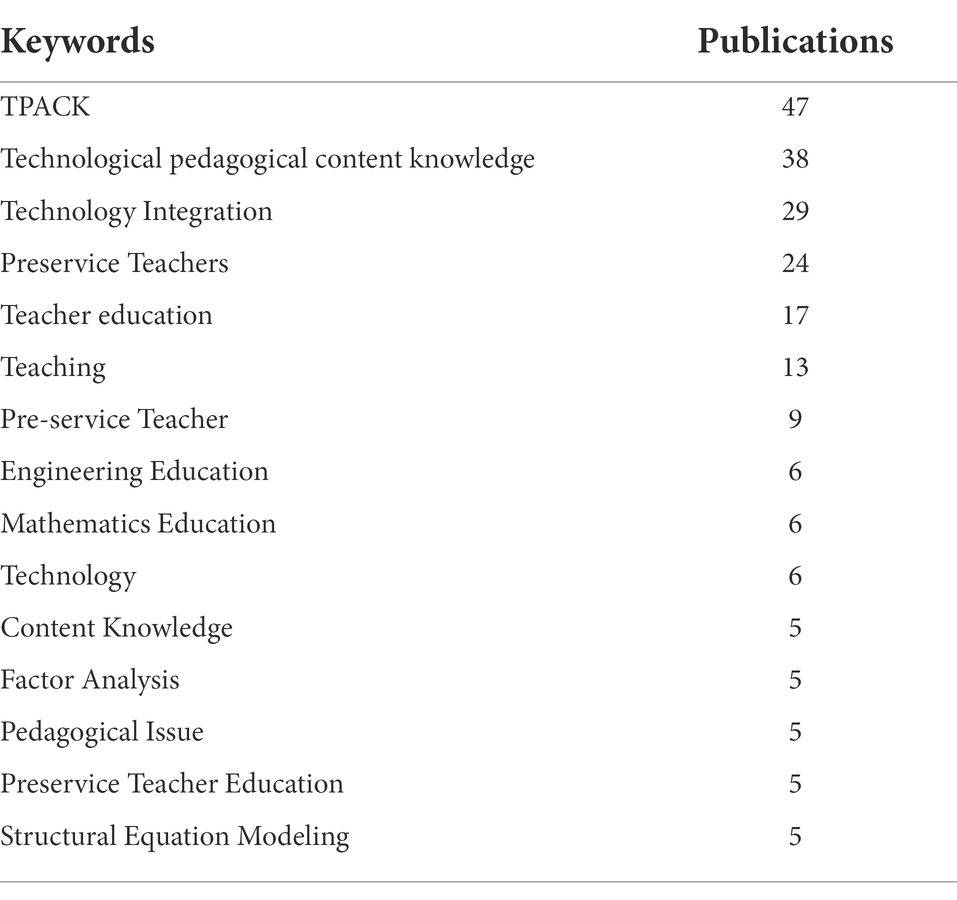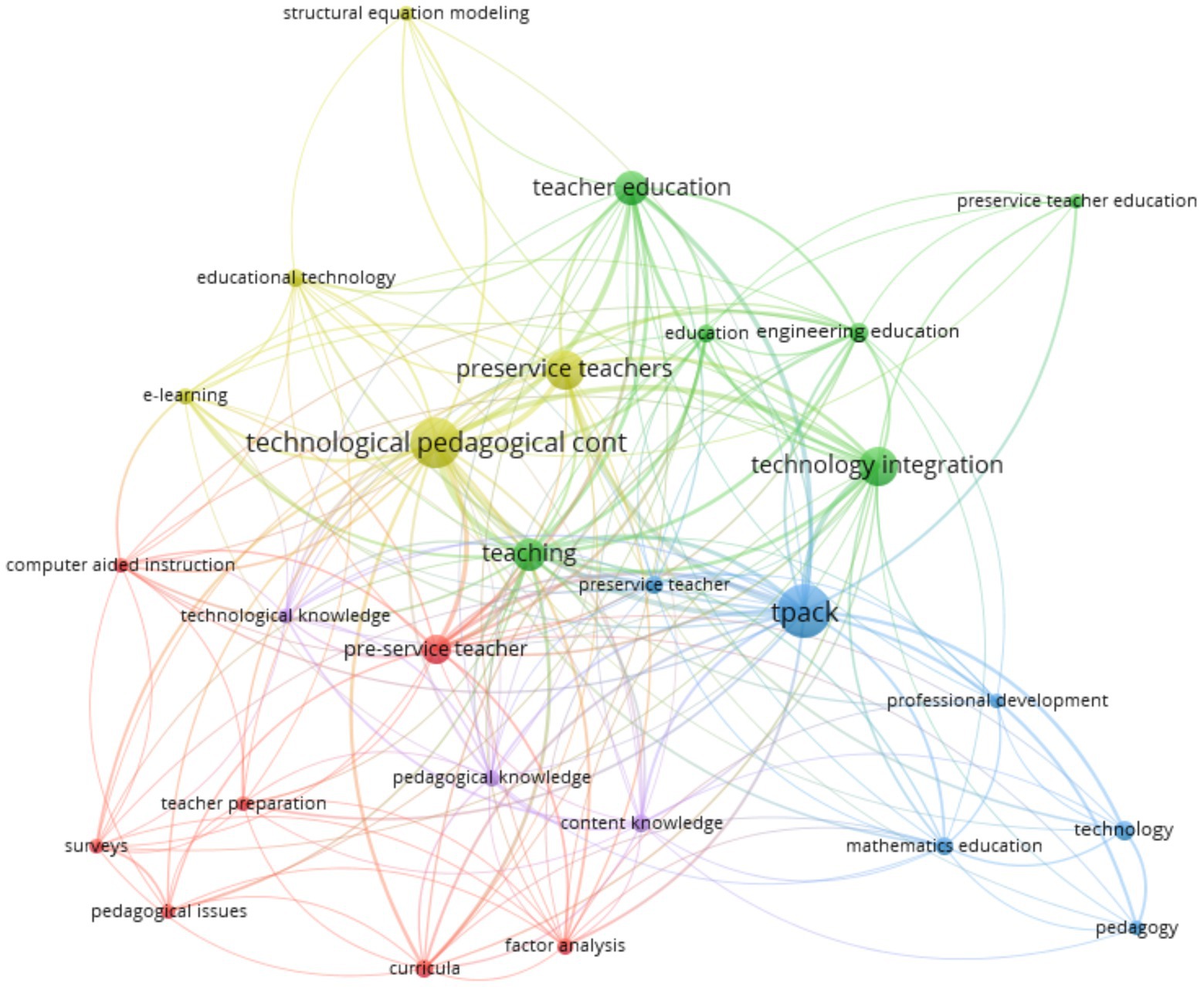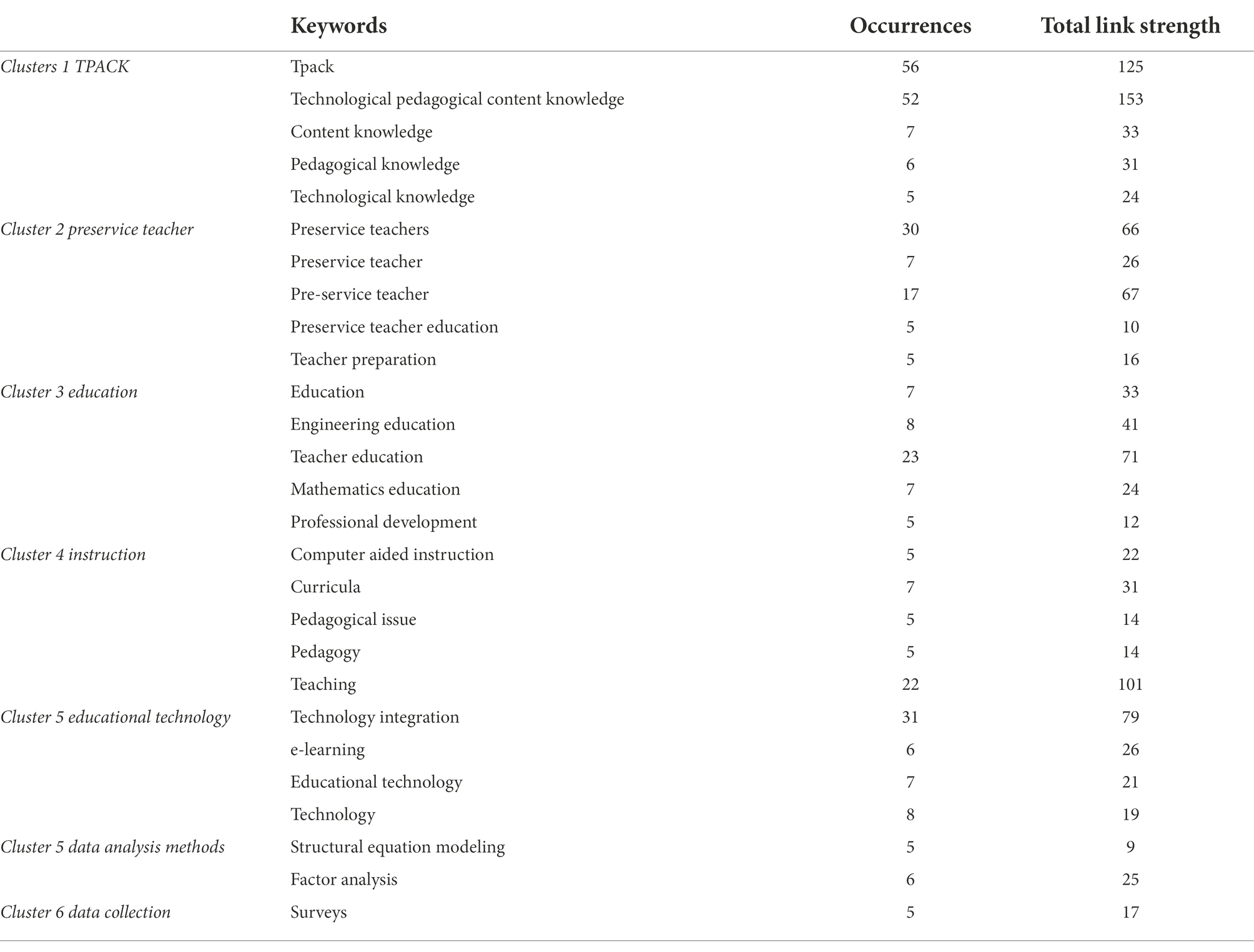- Faculty of Education, The University of Hong Kong, Pokfulam, Hong Kong SAR, China
Technological pedagogical content knowledge (TPACK) has become an emerging topic in teacher education research. This review aims to analyze the global trends of the research on preservice teachers’ technological pedagogical content knowledge (TPACK) development. The bibliometric approach examines preservice teachers’ TPACK by identifying the most cited publications, journals, authors, funding agencies, and keywords used in the eligible studies (N = 114). The results show that preservice teachers’ TPACK research began in 2007 and the scientific community’s interest in this subject has been irregular. This study presents a global perspective on preservice teachers’ TPACK and provides researchers with future directions.
Introduction
An influential theoretical framework for teaching with technology is called TPACK (technological pedagogical and content knowledge). The TPACK framework builds on Lee Shulman’s construct of pedagogical content knowledge (PCK) to include technological knowledge (Koehler and Mishra, 2009, p. 60). TPACK framework includes several knowledge components, such as technological knowledge (TK), technological pedagogical knowledge (TPK), technological content knowledge (TCK), and pedagogical content knowledge (PCK) (Graham, 2011).
Recently, many researchers adopted the TPACK framework in teacher education research (e.g., Lachner et al., 2021; Lai et al., 2022; Wollmann and Lange-Schubert, 2022), especially in preservice teacher settings (e.g., Luo et al., 2022; Zhou et al., 2022). However, although a number of to several reviews of TPACK literature exist (e.g., Rosenberg and Koehler, 2015; Wang et al., 2018; Yeh et al., 2021), there are apparently no studies discussing preservice teachers’ technological pedagogical content knowledge (TPACK) development using bibliometric analysis. Therefore, this review paper aims to present a thorough bibliometric analysis from Scopus databases of scientific publications, by (1) identifying productive publication sources, authors, journals, affiliations, and countries in the field of TPACK research targeting preservice teachers; (2) helping researchers to find collaborations, journals, and funding agencies; (3) providing recommendations for future plans for technological pedagogical content knowledge (TPACK) research focusing on preservice teachers.
What is TPACK?
The term “TPACK” refers to “the synthesized form of knowledge to integrate ICT/educational technology into classroom teaching and learning” (Chai et al., 2013, 2016). The technological pedagogical content knowledge (TPACK) framework, which is based on Shulman (1986, 1987) descriptions of pedagogical content knowledge (PCK), explains how teachers’ understanding of educational technologies and PCK interact with each other to achieve effective teaching using technology.
TPACK constructs
The three main components of TPACK are technological knowledge (TK), pedagogical knowledge (CK), and content knowledge (CK) (Koehler and Mishra, 2009), as shown in Figure 1. Pedagogical content knowledge (PCK), technological content knowledge (TCK), technological content knowledge (TPK), and TPACK are products of the interplay among these three fundamental types of knowledge.
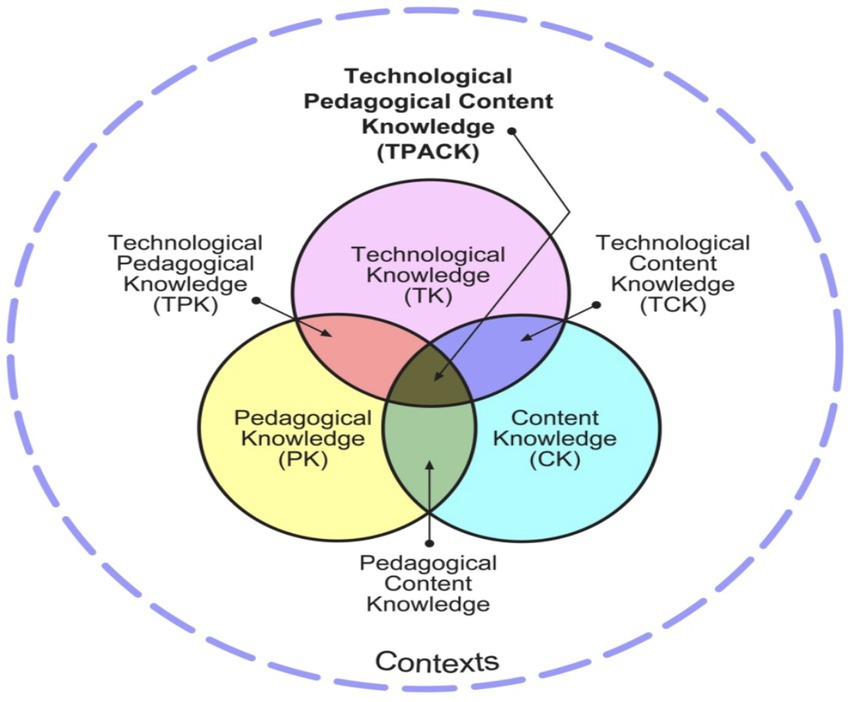
Figure 1. TPACK framework (Adopted from Koehler and Mishra (2009) study).
Bibliometric analysis
A methodology known as “bibliometric analysis” is an approach that employs a number of to several quantitative techniques to measure, track, and analyze scholarly literature (Roemer and Borchardt, 2015). The bibliometric analysis offers “quantitative confirmation of subjectively derived categories in published reviews as well as for exploring the research landscape and identifying the categories” (Zupic and Cater, 2015; Hasumi and Chiu, 2022). In additional, it identifies the authors’ publications, the top journals, research collaborations, and the most popular keywords used (Aria and Cuccurullo, 2017; Xue and He, 2021). Most educational studies used VOSviewer to analyze and conduct a bibliometric analysis (e.g., Gillani et al., 2022; Su et al., 2022). Therefore, VOSviewer software was used for data analyses in this study.
In recent years, bibliometric analysis has become popular in educational research (e.g., Rojas-Sánchez et al., 2022; Su et al., 2022; Zhang et al., 2022). Researchers use bibliometric analysis for several purposes, including developing trends in article and journal performance, collaboration patterns, and the intellectual framework to examine of a specific domain in the existing literature (Djeki et al., 2022; Su et al., 2022). In additional, bibliometric analysis can be found in the scientific literature. For example, a recent study by Su et al. (2022) investigated ECE during the COVID-19 pandemic using bibliometric methods by analyzing a total of 507 articles from the web of science (WOS) and Scopus databases between 2020 and 2022. This article presented the research landscape of the top research publications, authors, institutions, countries, and keywords. Since the characteristics of the most widely referenced works in the field of preservice teachers’ technological pedagogical content knowledge (TPACK) development have received minimal attention in academia, this study seeks to investigate the research trends of the most cited articles about preservice teachers’ technological pedagogical content knowledge (TPACK) development published in Social Science Citation Index (SSCI) journals.
Methods and data
Article selection process
The Preferred Reporting Items for Systematic Reviews and Meta-Analyses (PRISMA) recommendation statement (Moher et al., 2009) was followed in this bibliometric review. Scholarly literature on this topic was searched on the Scopus database. Numerous review articles have highlighted that the Scopus database is suitable for bibliometric analysis in the field of education (e.g., Ghani et al., 2022; Supriadi et al., 2022). It is one of the most widely used databases in various scientific fields, and is frequently used for literature searches (Singh et al., 2021).
We formulated a search string based on our understanding of and knowledge of the TPACK domain and referred to related TPACK education search strings used in other studies, such as Zou et al. (2022). The search terms include “technological pedagogical content knowledge” AND “TPACK” OR “TPCK” AND preservice teacher* OR pre-service teacher. Content analysis of keywords was used as a method of analysis within this study. The search was limited to publications written in English and journal articles. Therefore, a total of 159 articles were retrieved.
Exclusion criteria
The corresponding databases applied two exclusion criteria (EC) to exclude irrelevant literature. First, to ensure the quality of this article, only journal articles were included in this study, disregarding other document types, such as books, conference proceedings, and book series (n = 40). Second, articles written in other languages, such as Turkish, Chinese, French, and Spanish, were excluded (n = 7).
Analysis
Having applied the criteria above, 112 studies were selected. Figure 2 below provides an overview of our search protocol. The preliminary analysis of articles highlighted the annual frequency of publications, representative journals, countries/regions, institutions, and the most commonly researched keywords. Next, the study of keyword co-occurrence was carried out using VOSviewer.
Research questions
The five research questions (RQs) in our bibliometric analysis focusing on the research on the development of preservice teachers’ technological pedagogical content knowledge (TPACK) from 2007 to 2022 are as follows:
RQ1: What was the annual trend of preservice teachers’ TPACK research?
RQ2: Which representative journals, journals, countries/regions, institutions, and funding agencies were the major preservice teachers’ TPACK research contributors?
RQ3: Who were the most productive researchers for preservice teachers’ TPACK research?
RQ4: In which research areas were the issue of the development of preservice teachers’ TPACK addressed?
RQ5: What were the most cited keywords of preservice teachers’ TPACK research?
Results
RQ1: What was the annual trend of preservice teachers’ TPACK research?
Figure 3 shows the annual counts of research on the development of preservice teachers’ technological pedagogical content knowledge (TPACK) from 2007 to 2022. A total of 114 eligible articles have been found in the Scopus database. 2021 was found to be the most published year (Table 1).
RQ2: Which representative journals, journals, countries/regions, institutions, and funding agencies were the major preservice teachers’ TPACK research contributors?
Representative journals
The number of citations of a journal article’s publication indicates influential research (Tsay, 2008). Three top representative articles, which focus on online professional development, mentorship, and instrument development, are shown in Table 2.
Table 2 indicated that the most cited journal articles published in Scopus were from the renowned researchers in this field. For example, the article.
“Technological pedagogical content knowledge (TPACK): The development and validation of an assessment instrument for preservice teachers” by Schmidt et al. (2009) received 696 citations in Scopus.
Top journals
A total of 72 journals have published research on developing preservice teachers’ technological pedagogical content knowledge (TPACK) from Scopus databases. In additional, six journals published more than five articles on this topic, such as Computers & Education, Journal of Research on Technology in Education, Australasian Journal of Educational Technology, Journal of Digital Learning in Teacher Education, British Journal of Educational Technology, and Journal of Educational Computing Research (Table 3).
Countries/regions
In total, 25 countries/regions produced research on developing preservice teachers’ technological pedagogical content knowledge (TPACK) from the Scopus database. However, six countries published more than seven articles from the Scopus database, including the United States, Turkey, Australia, Hong Kong, Taiwan, and Singapore. The USA contributed 43 (42%) publications. These findings demonstrate that the USA is more interested in this topic (Table 4).
Institutions
108 institutions have contributed to 114 publications about developing preservice teachers’ technological pedagogical content knowledge (TPACK) in Scopus. The Scopus database shows that the most contributive institutions were Nanyang Technological University (7 articles), The Chinese University of Hong Kong (5 articles), Middle East Technical University (5 articles), and Selçuk Üniversitesi (5 articles), as shown in Table 5.
Funding agencies
46 funding agencies showed interest in investing in research on developing preservice teachers’ technological pedagogical content knowledge (TPACK) in Scopus. Three funding agencies funded the most research projects on this research topic, namely the National Science Foundation (United States), the Ministry of Science and Technology (Taiwan), and the National Taiwan Normal University (Taiwan), as shown in Table 6. Research on developing preservice teachers’ technological pedagogical content knowledge (TPACK) garners more attention in Taiwan.
RQ3: Who were the most productive researchers for preservice teachers’ TPACK research?
The most productive authors with their affiliated institutions and countries in research on the development of preservice teachers’ technological pedagogical content knowledge (TPACK) are shown in Table 7. This can assist researchers in finding appropriate collaborators and institutions for their research. The most productive researchers on this topic are Chai, C.S. (9 publications), Koh, J.H.L. (5 publications), Karchmer-Klein, R. (4 publications), and Mouza, C. (4 publications).
RQ4: In which research areas were the issue of the development of preservice teachers’ technological pedagogical content knowledge (TPACK) addressed?
According to the Scopus database, this topic is the most frequently discussed in the field of social sciences, followed by Computer Science, Art and Humanities, and Engineering, as shown in Table 8.
RQ5: What were the most cited keywords of preservice teachers’ TPACK research?
The keywords help researchers find the most relevant information (Guo et al., 2019). For example before 15 keywords were shown more than five times in studies on the development of preservice teachers’ technological pedagogical content knowledge (TPACK) in the Scopus database, including ‘TPACK’, ‘technological pedagogical content knowledge’, ‘Technology Integration’, ‘Preservice Teachers’, ‘Teacher education’, ‘Teaching’, ‘Pre-service Teacher’, ‘Engineering Education’, ‘Mathematics Education’, ‘Technology’, ‘Content Knowledge’, ‘Factor Analysis’, ‘Pedagogical Issue’, ‘Preservice Teacher Education’, and ‘Structural Equation Modeling’, as shown in Table 9. We found that factor analysis (FA) and structural equation modeling (SEM) were important analysis methods in research on the development of preservice teachers’ technological pedagogical content knowledge (TPACK), as evidenced by how it was both used five times as keywords. For example, Chai et al. (2019) used the SEM model as a data analysis method. These two analysis methods (i.e., FA and SEM) are appropriate for research on TPACK in preservice teachers.
We used the VOSviewer to perform keyword co-occurrence analysis. Twenty-seven keywords were shown more than five times in the Scopus database, as shown in Figure 4. TPACK is the leading keyword and has stronger links with tpack, technology integration, and pre-service teachers. Figure 4 shows the detection of relevant main topics, participants, and data analysis methods used. Most of the research on preservice teachers’ TPACK was quantitative such as factor analysis and structural equation modeling. The majority of these studies used a survey design (5 times). For example, Schmidt et al. (2009) used a surveys to assess preservice teachers’ self-assessment of the TPACK framework, including technological knowledge (TK), content knowledge (CK), pedagogical knowledge (PK), pedagogical content knowledge (PCK), technological content knowledge (TCK), technological pedagogical knowledge (TPK), and technological pedagogical content knowledge (TPACK).
Co-occurrence
Keyword clustering
To better understand the significance of various keywords, Table 10 shows the keyword clustering. According to the measurements of keyword centrality, Technological pedagogical content knowledge (TPACK) was the keyword with the highest influence. It was found that preservice teachers’ TPACK surveys were also used in other fields, such as engineering and Mathematics education (e.g., Larkin et al., 2012; Tokmak et al., 2013; Putro et al., 2020). For example, Larkin et al. (2012) used the TPACK framework, which includes TPK, TK, TPCK, PCK, and TCK, to assess preservice teachers’ ability to teach Mathematics. Agyei and Voogt (2015) adopted a TPACK survey to assess preservice teachers’ perceived development in their TPACK. ‘Tpack’ was the most frequently used keyword in this research, followed by ‘Technological pedagogical content knowledge’. Third, some studies the proposed model using SEM and FA analysis (e.g., Dong et al., 2015; Joo et al., 2018; Kabakci Yurdakul, 2018).
SEM is a method used to establish associations between a scale and the independent variables hypothesized to influence the scale. For example, “A structural equation model was generated using AMOS 16.0 software to test whether digital nativity was a determinant of TPACK-deep” (Kabakci Yurdakul, 2018). Lastly, several studies used surveys to assess teachers’ perceptions of TPACK constructs (e.g., Jamieson-Proctor et al., 2010; Dong et al., 2015; Gabriele et al., 2019). For example, Dong et al. (2015) used surveys to “measure teachers’ perceptions concerning the extent to which they agreed or disagreed with statements related to the seven TPACK constructs and their beliefs concerning the constructivism and design deposition” (p. 161).
Dong et al. (2015) used the SEM model to examine whether or not to predict TPACK. Results show that the primary forms of knowledge (CK, PK, and TK) predict the secondary forms of knowledge (TPK, TCK, and PCK) and that TCK and TPK predict TPACK.
Discussion and conclusion
This study analyzes a selection of recent articles with the help of the Scopus database to identify research trends in studies centering on preservice teachers’ TPACK. The research publications were examined using the bibliometric technique in terms of publications, prolific countries/regions, institutions, funding agencies, journals, publishers, and keyword distributions. These results help researchers find a potential research topic, collaborators, institutions, and funding agencies.
This review of research is the first bibliometric review focusing on the literature on preservice teachers’ TPACK. It seeks to shed light on the trends in the publication of studies on the development of preservice teachers’ TPACK through bibliometric analysis of 112 Scopus-indexed journal articles published between 2007 and 2022. Recently, more and more literature reviews on TPACK have been published (e.g., Wang et al., 2018; Yeh et al., 2021; Tseng et al., 2022). This trend is consistent with findings reported by Lee et al. (2022).
However, the research trends of preservice teachers’ TPACK were not a focus of these articles. It was discovered that the majority of literature was authored in developed societies: the United States (43 publications), Turkey (29 publications), Australia (8 publications), Hong Kong (8 publications), and Singapore (7 publications). This result was consistent with findings reported by Irwanto (2021) and Dewi et al. (2021). Possible factors influencing developing countries’ interest in preservice teachers’ TPACK include research funding, resources, and social environments. Studies on preservice teachers’ TPACK are more frequently featured in high-quality educational journals, including Computers & Education (9 publications, 378 citations), British Journal of Educational Technology (6 publications, 99 citations), Journal of Research on Technology in Education (8 publications, 1,054 citation).
White and McCain (1998) mentioned that “a strength of the bibliometric analysis is its capacity to identify key authors and texts through empirical analysis of the literature” (p. 327). This review’s citation and co-citation analyses identified which researchers most contributed to preservice teachers’ TPACK research: Chai, Koh, Karchmer-Klein, and Mouza. The authors above are from developed countries/regions: Hong Kong, New Zealand, and the United States.
Potential research topics
Self-regulated learning. Only three studies focus on self-regulated learning integrated technological pedagogical content knowledge (TPCK) context (Kramarski and Michalsky, 2010; Angeli et al., 2015; Huang et al., 2021). Kramarski and Michalsky (2010) used the motivated strategies for learning questionnaire (MSLQ) to assess preservice teachers’ self-reported SRL components, including cognition, metacognition, and motivation. For example, “When I read material for the course, I say the words over and over to myself to help me remember,” “When I study for this course, I put important ideas into my own words,” and “I outline the chapters in my task to help me study” (Kramarski and Michalsky, 2010, p. 441). Results show that preservice teachers’ capacity to evaluate their learning processes may be improved by adopting the improved self-questioning technique. Most studies examining “cognition,” “metacognition,” and “motivation” in technology education underscored the significance of these SRL components (e.g., Barak, 2010; Azevedo and Aleven, 2013). Therefore, the first potential research topic is the self-regulated learning integrated technological pedagogical content knowledge (TPCK) context.
Teachers’ attitudes toward technology. Only one study focuses on teachers’ attitudes towards technology (Banas, 2010). Banas (2010) designed TPCK-related instruction and assessed teachers’ attitudes toward technology. Results show that more than half had positive feelings about integrating technology into instruction. This finding, nonetheless, was not corroborated by other studies as the majority of them examined teachers’ perceptions of technology without referring to the TPACK framework (e.g., Albirini, 2006; Yildiz Durak, 2021). Therefore, teachers’ attitudes towards technology in the TPACK context is the second potential research topic.
Contributions
This review study contributes to the TPACK field in several aspects. To begin with, it offers researchers a comprehensive overview of the research status and development of preservice teachers’ technological pedagogical content knowledge. Second, it assists researchers in identifying the authors, institutions, and countries/regions with the most potential to develop this research topic and find suitable collaborators. Third, the keywords identified help researchers locate the most essential information and understand the research hotspots in this field. Fourth, the most influential journals in this field have been pinpointed for researchers and research students.
Limitations
This review study has three limitations. First, a meta-analysis, which is not included in this study, is required to gain a deeper understanding of research on preservice teachers’ TPACK. Second, two keywords (e.g., “TPACK” and “TPCK”) are arguably not distinctive enough to narrow down research topics. Lastly, the range of data collected was limited since it was only extracted from the Scopus database, but not other databases (e.g., Web of Sciences).
Author contributions
JS contributed to conception and design of the study, organized the database, performed the statistical analysis, writing-original draft preparation, and writing—review and editing.
Conflict of interest
The author declares that the research was conducted in the absence of any commercial or financial relationships that could be construed as a potential conflict of interest.
Publisher’s note
All claims expressed in this article are solely those of the authors and do not necessarily represent those of their affiliated organizations, or those of the publisher, the editors and the reviewers. Any product that may be evaluated in this article, or claim that may be made by its manufacturer, is not guaranteed or endorsed by the publisher.
References
Agyei, D. D., and Voogt, J. M. (2015). Pre-service teachers’ TPACK competencies for spreadsheet integration: insights from a mathematics-specific instructional technology course. Technol. Pedagog. Educ. 24, 605–625. doi: 10.1080/1475939X.2015.1096822
Albirini, A. (2006). Teachers’ attitudes toward information and communication technologies: the case of Syrian EFL teachers. Comput. Educ. 47, 373–398. doi: 10.1016/j.compedu.2004.10.013
Angeli, C., Valanides, N., Mavroudi, A., Christodoulou, A., and Georgiou, K. (2015). “Introducing e-TPCK: an adaptive e-learning technology for the development of teachers’ technological pedagogical content knowledge,” in Technological pedagogical content knowledge. eds. C. Angeli and N. Valanides (Boston, MA: Springer), 305–317.
Aria, M., and Cuccurullo, C. (2017). Bibliometrix: an R-tool for comprehensive science mapping analysis. J. Inf. Secur. 11, 959–975. doi: 10.1016/j.joi.2017.08.007
Azevedo, R., and Aleven, V. (Eds.). (2013). International handbook of metacognition and learning technologies (vol. 26). Amsterdam, The Netherlands: Springer.
Banas, J. R. (2010). Teachers' attitudes toward technology: considerations for designing preservice and practicing teacher instruction. Community Jr. Coll. Libr. 16, 114–127. doi: 10.1080/02763911003707552
Barak, M. (2010). Motivating self-regulated learning in technology education. Int. J. Technol. Des. Educ. 20, 381–401. doi: 10.1007/s10798-009-9092-x
Chai, C. S., Hwee Ling Koh, J., and Teo, Y. H. (2019). Enhancing and modeling teachers’ design beliefs and efficacy of technological pedagogical content knowledge for 21st century quality learning. J. Educ. Comput. Res. 57, 360–384. doi: 10.1177/0735633117752453
Chai, C. S., Koh, J. H. L., and Tsai, C. C. (2013). A review of technological pedagogical content knowledge. J. Educ. Technol. Soc. 16, 31–51.
Chai, C. S., Koh, J. H. L., and Tsai, C. C. (2016). “6A review of the quantitative measures of technological pedagogical content knowledge (TPACK),” in Handbook of technological pedagogical content knowledge (TPACK) for educators. Taylor & Francis Group. 97–116.
Dewi, N. R., Rusilowati, A., Saptono, S., Haryani, S., Wiyanto, W., Ridlo, S., et al. (2021). Technological, pedagogical, content knowledge (TPACK) research trends: a systematic literature review of publications between 2010-2020. J. Turkish Science Educ. 18, 589–604. doi: 10.36681/tused.2021.92
Djeki, E., Dégila, J., Bondiombouy, C., and Alhassan, M. H. (2022). E-learning bibliometric analysis from 2015 to 2020. J. Computers in Educ. 9, 727–754. doi: 10.1007/s40692-021-00218-4
Dong, Y., Chai, C. S., Sang, G. Y., Koh, J. H. L., and Tsai, C. C. (2015). Exploring the profiles and interplays of pre-service and in-service teachers' technological pedagogical content knowledge (TPACK) in China. J. Educ. Technol. Soc. 18, 158–169.
Gabriele, L., Bertacchini, F., Tavernise, A., Vaca-Cárdenas, L., Pantano, P., and Bilotta, E. (2019). Lesson planning by computational thinking skills in Italian pre-service teachers. Informat. Educ. 18, 69–104. doi: 10.15388/infedu.2019.04
Ghani, N. A., Teo, P. C., Ho, T. C., Choo, L. S., Kelana, B. W. Y., Adam, S., et al. (2022). Bibliometric analysis of global research trends on higher education internationalization using Scopus database: towards sustainability of higher education institutions. Sustain. For. 14:8810. doi: 10.3390/su14148810
Gillani, S. M., Senin, A. B. A., Bode, J., and Gillani, S. M. (2022). Bibliometric analysis of digital entrepreneurial education and student intention; reviewed and analyzed by VOSViewer from Google scholar. Int. J. Interactive Mobile Technologies (iJIM) 16, 48–65. doi: 10.3991/ijim.v16i13.30619
Graham, C. R. (2011). Theoretical considerations for understanding technological pedagogical content knowledge (TPACK). Comput. Educ. 57, 1953–1960. doi: 10.1016/j.compedu.2011.04.010
Guo, Y. M., Huang, Z. L., Guo, J., Li, H., Guo, X. R., and Nkeli, M. J. (2019). Bibliometric analysis on smart cities research. Sustain. For. 11:3606. doi: 10.3390/su11133606
Hasumi, T., and Chiu, M. S. (2022). Online mathematics education as bio-eco-techno process: bibliometric analysis using co-authorship and bibliographic coupling. Scientometrics 127, 4631–4654.
Huang, L., Li, S., Poitras, E. G., and Lajoie, S. P. (2021). Latent profiles of self-regulated learning and their impacts on teachers’ technology integration. Br. J. Educ. Technol. 52, 695–713. doi: 10.1111/bjet.13050
Irwanto, I. (2021). Research trends in technological pedagogical content knowledge (TPACK): a systematic literature review from 2010 to 2021. Eurasian J. Educ. Res. 10, 2045–2054. doi: 10.12973/eu-jer.10.4.2045
Jamieson-Proctor, R., Finger, G., and Albion, P. (2010). Auditing the TK and TPACK confidence of pre-service teachers: are they ready for the profession? Australian Educational Computing 25, 8–17.
Joo, Y. J., Park, S., and Lim, E. (2018). Factors influencing preservice teachers’ intention to use technology: TPACK, teacher self-efficacy, and technology acceptance model. J. Educ. Technol. Soc. 21, 48–59.
Kabakci Yurdakul, I. (2018). Modeling the relationship between pre-service teachers’ TPACK and digital nativity. Educ. Technol. Res. Dev. 66, 267–281. doi: 10.1007/s11423-017-9546-x
Koehler, M., and Mishra, P. (2009). What is technological pedagogical content knowledge (TPACK)? Contemporary issues in technology and teacher education 9, 60–70.
Kramarski, B., and Michalsky, T. (2010). Preparing preservice teachers for self-regulated learning in the context of technological pedagogical content knowledge. Learn. Instr. 20, 434–447. doi: 10.1016/j.learninstruc.2009.05.003
Lachner, A., Fabian, A., Franke, U., Preiß, J., Jacob, L., Führer, C., et al. (2021). Fostering pre-service teachers’ technological pedagogical content knowledge (TPACK): a quasi-experimental field study. Comput. Educ. 174:104304. doi: 10.1016/j.compedu.2021.104304
Lai, C., Wang, Q., and Huang, X. (2022). The differential interplay of TPACK, teacher beliefs, school culture and professional development with the nature of in-service EFL teachers' technology adoption. Br. J. Educ. Technol. 53, 1389–1411. doi: 10.1111/bjet.13200
Larkin, K., Jamieson-Proctor, R., and Finger, G. (2012). TPACK and pre-service teacher mathematics education: defining a signature pedagogy for mathematics education using ICT and based on the metaphor “mathematics is a language”. Comput. Sch. 29, 207–226. doi: 10.1080/07380569.2012.651424
Lee, H. Y., Chung, C. Y., and Wei, G. (2022). Research on technological pedagogical and content knowledge: a bibliometric analysis from 2011 to 2020. Front. Educ. 7:765233. doi: 10.3389/feduc.2022.765233
Luo, W., Berson, I. R., Berson, M. J., and Park, S. (2022). An exploration of early childhood teachers’ technology, pedagogy, and content knowledge (TPACK) in mainland China. Early Educ. Dev. 1–16. doi: 10.1080/10409289.2022.2079887
Moher, D., Liberati, A., Tetzlaff, J., and Altman, D. G., PRISMA Group (2009). Preferred reporting items for systematic reviews and meta-analyses: the PRISMA statement. Ann. Intern. Med. 151, 264–269. doi: 10.7326/0003-4819-151-4-200908180-00135
Putro, S. C., Hidayat, W. N., Jiono, M., Nidhom, A. M., and Syarif, J. (2020). Contribution of tpack for a pedagogical capability in the vocational pre-service teachers for electrical engineering education. Jurnal Pendidikan Teknologi dan Kejuruan 26, 173–182. doi: 10.21831/jptk.v26i2.29926
Roemer, R. C., and Borchardt, R. (2015). Meaningful metrics: A 21st century librarian's guide to bibliometrics, altmetrics, and research impact. American Library Association Tech Source. p. 241.
Rojas-Sánchez, M. A., Palos-Sánchez, P. R., and Folgado-Fernández, J. A. (2022). Systematic literature review and bibliometric analysis on virtual reality and education. Educ. Inf. Technol. 1–38. doi: 10.1007/s10639-022-11167-5
Rosenberg, J. M., and Koehler, M. J. (2015). Context and technological pedagogical content knowledge (TPACK): a systematic review. J. Res. Technol. Educ. 47, 186–210. doi: 10.1080/15391523.2015.1052663
Schmidt, D. A., Baran, E., Thompson, A. D., Mishra, P., Koehler, M. J., and Shin, T. S. (2009). Technological pedagogical content knowledge (TPACK) the development and validation of an assessment instrument for preservice teachers. J. Res. Technol. Educ. 42, 123–149. doi: 10.1080/15391523.2009.10782544
Shulman, L. (1986). Those who understand: knowledge growth in teaching. Educ. Res. 15, 4–14. doi: 10.3102/0013189X015002004
Shulman, L. S. (1987). Knowledge and teaching: foundations of the new reform. Harv. Educ. Rev. 57, 1–23. doi: 10.17763/haer.57.1.j463w79r56455411
Singh, V. K., Singh, P., Karmakar, M., Leta, J., and Mayr, P. (2021). The journal coverage of web of science, Scopus and dimensions: a comparative analysis. Scientometrics 126, 5113–5142. doi: 10.1007/s11192-021-03948-5
Su, J., Ng, D. T. K., Yang, W., and Li, H. (2022). Global trends in the research on early childhood education during the COVID-19 pandemic: a bibliometric analysis. Educ. Sci. 12:331. doi: 10.3390/educsci12050331
Supriadi, U., Supriyadi, T., Abdussalam, A., and Rahman, A. A. (2022). A decade of value education model: a bibliometric study of Scopus database in 2011-2020. Eurasian J. Educ. Res. 11, 557–571. doi: 10.12973/eu-jer.11.1.557
Tokmak, H. S., Incikabi, L., and Ozgelen, S. (2013). An investigation of change in mathematics, science, and literacy education pre-service teachers’ TPACK. Asia Pac. Educ. Res. 22, 407–415. doi: 10.1007/s40299-012-0040-2
Tsay, M.-Y. (2008). Journal bibliometric analysis: a case study on the JASIST. Malays. J. Libr. Inf. Sci. 13
Tseng, J. J., Chai, C. S., Tan, L., and Park, M. (2022). A critical review of research on technological pedagogical and content knowledge (TPACK) in language teaching. Comput. Assist. Lang. Learn. 35, 948–971. doi: 10.1080/09588221.2020.1868531
Wang, W., Schmidt-Crawford, D., and Jin, Y. (2018). Preservice teachers' TPACK development: a review of literature. J. Digital Learning in Teacher Educ. 34, 234–258. doi: 10.1080/21532974.2018.1498039
White, H. D., and McCain, K. W. (1998). Visualizing a discipline: an author co-citation analysis of information science, 1972–1995. J. Am. Soc. Inf. Sci. 49, 327–355.
Wollmann, K., and Lange-Schubert, K. (2022). The development of prospective primary school science teachers’ TPaCK fostered by innovative science-teacher education. Educ. Sci. 12:381. doi: 10.3390/educsci12060381
Xue, C., and He, W. (2021). Research hotspots and trends on TPACK in WOS based on visual analysis. Open J. Soc. Sci. 09, 305–321. doi: 10.4236/jss.2021.92021
Yeh, Y. F., Chan, K. K. H., and Hsu, Y. S. (2021). Toward a framework that connects individual TPACK and collective TPACK: a systematic review of TPACK studies investigating teacher collaborative discourse in the learning by design process. Comput. Educ. 171:104238. doi: 10.1016/j.compedu.2021.104238
Yildiz Durak, H. (2021). Modeling of relations between K-12 teachers’ TPACK levels and their technology integration self-efficacy, technology literacy levels, attitudes toward technology and usage objectives of social networks. Interact. Learn. Environ. 29, 1136–1162. doi: 10.1080/10494820.2019.1619591
Zhang, L., Carter, R. A. Jr., Qian, X., Yang, S., Rujimora, J., and Wen, S. (2022). Academia's responses to crisis: a bibliometric analysis of literature on online learning in higher education during COVID-19. Br. J. Educ. Technol. 53, 620–646. doi: 10.1111/bjet.13191
Zhou, C., Wu, D., Li, Y., Yang, H. H., Man, S., and Chen, M. (2022). The role of student engagement in promoting teachers’ continuous learning of TPACK: based on a stimulus-organism-response framework and an integrative model of behavior prediction. Educ. Inf. Technol. 1–21. doi: 10.1007/s10639-022-11237-8
Zou, D., Huang, X., Kohnke, L., Chen, X., Cheng, G., and Xie, H. (2022). A bibliometric analysis of the trends and research topics of empirical research on TPACK. Educ. Inf. Technol. 27, 10585–10609. doi: 10.1007/s10639-022-10991-z
Keywords: technological pedagogical content knowledge (TPACK), potential research topics, preservice teachers, Preservice Teacher Education, bibliometric analysis
Citation: Su J (2023) Preservice teachers’ technological pedagogical content knowledge development: A bibliometric review. Front. Educ. 7:1033895. doi: 10.3389/feduc.2022.1033895
Edited by:
Stefinee Pinnegar, Brigham Young University, United StatesReviewed by:
Mario Mäeots, University of Tartu, EstoniaCopyright © 2023 Su. This is an open-access article distributed under the terms of the Creative Commons Attribution License (CC BY). The use, distribution or reproduction in other forums is permitted, provided the original author(s) and the copyright owner(s) are credited and that the original publication in this journal is cited, in accordance with accepted academic practice. No use, distribution or reproduction is permitted which does not comply with these terms.
*Correspondence: Jiahong Su, bWFnZ2llc3VAY29ubmVjdC5oa3UuaGs=
 Jiahong Su
Jiahong Su